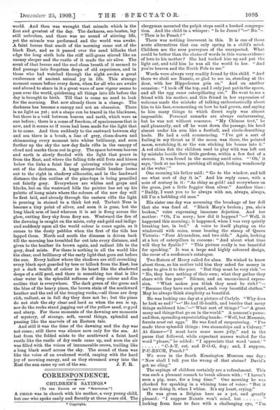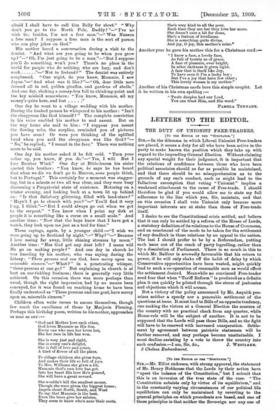CORRESPONDENCE.
CHILDREN'S SAYINGS.*
To THE EDITOR. OP THE " SPECTATOR."1
A CHILD was in church with his mother, a very young child, but one who spoke easily and fluently at three years old. The
* Copyrigixt,
clergyman mounted the pulpit steps amid a hushed congrega- tion. And the child in a whisper : " Is he Jesus ? "—" No."— " Then is he Punch ? "
There was nothing irreverent in this. It is one of those acute alternatives that can only spring in a child's mind. Children are the sure purveyors of the unexpected. What could be better than the choice of words in this warm evidence of love to his mother P She had tucked him up and put the light out, and told him he was all the world to her. "And you're heaven and the North Pole to me."
Words were always very readily found by this child. "And there we shall see Nannie, so glad to see us, standing at tha door, with her Hippodrome grin on." And on another occasion: " I took off the top, and I only just put in the spoon, and all the egg came caterpillaring out." He went to see a friend with his mother, and this friend in her expression of welcome made the mistake of talking enthusiastically about him to his face, commenting on how he had grown, and saying to him many things to which direct reply was almost impossible. Personal remarks are always embarrassing, but he was not without resource. "My Chinese trot," he said pleasantly, and off he went down the passage, his head almost under his arm like a football, and circle-describing heels. He had a cold commencing. "I've got a sort of feeling in my throat as if the moon was there, the pointed moon, scratching it, or the sun sticking his beams into it." A red china fish the children used to play with was left out by mistake beside their little gardens, within a few feet of a stream. It was found in the morning amid cries. " Oh,' it says, 'look at me here, parching all night, looking wondrously at the water."
One morning his father said : " Go to the window, and tell me what sort of day it is." And his reply came, with a note of ecstasy in it : "As shiny as gold! and everywhere on the grass, just a little foggier than silver." Another time : " Daddy, I want you to be always with me, always, always, till I'm a hobbling old man."
His sister one day was mourning the breakage of her doll that she was fond of. "Black Mary's broken; yes, she's broken," voice expressing immense dejection. And her mother: "Oh, I'm sorry; how did it happen? "—" Well, it happened this morning; it happened, when I was very quietly breaking her, in bed." A voice to itself playing on the windowsill with coins, some bearing the stamp of Queen Victoria: "Four Alexandras, and two olds." Again, looking at a box of caterpillars in cocoons : " And about what time will they be flyable? " "This picture really is too beautiful for speaking." It was a large and highly coloured design, the cover of a seedsman's catalogue.
Two Sisters of Mercy called for alms. He wished to know about them, so his mother told him they asked for money in order to give it to the poor. "But they must be very rich."- " No, they have nothing of their own; what they gather they share with the poor." Silence, and an unconvinced expres- sion. "What makes you think they must be rich ? "— " Because they have such grand, such very beautiful clothes." May he always think simplicity as beautiful.
He was looking one day at a picture of Carlyle. "Why does he look so sad ? "—" He had ill-health, and besides that many things saddened him."—" What sort of things? "—" A great many sad things that go on in the world." A moment's pause: and then, spreading expostulating hands : "Well, but Mummie, ferrets must eat eggs." He was fond of carpentering. " I've made three splendid things : two steamships and a Calvary." At dinner—" I must have some more jelly," and in the pause that followed, while expectant nurses waited for the word " please," he added : " I appreciate that word must.' "
" C-A-T, cat, and D-O-G, dog ; and, I suppose, P-U-ENCH, Punch?"
We were in the South Kensington Museum one day : "Now shall I tell you the wrong of that statue? David's got no sling."
The sayings of children certainly are a refreshment. This was such a pleasant remark to break silence with : " I haven't seen a pig, near, for a long time." One morning he was checked for speaking in a whining tone of voice : " But it isn't me doing it, when I whine. It's my heart, crying."
He was given a Belgian hare as a pet, and greatly pleased : "I suppose Nannie won't mind, but . . . . . . " looking from face to face with a challenging eye, "I'm
afraid I shall have to call him Belly for short." " Why don't you go to the North Pole, Daddy? "—" I've no wish to ; besides, I'm not a free man."—" Was Nansen a free man ? I suppose a free man is the sort of person who can play jokes on God."
His mother heard a conversation during a visit to the dentist. " And what are you going to be when you grow up P "—" Oh, I'm just going to be a man."—" But I suppose you'll do something, won't you There's no place in the world for people who do nothing, who are lazy, and don't
work "—" Not in Ireland?" The dentist was entirely nonplussed. " One night, do you know, Mummie, I saw Japan."—" And what was it like ?"—" Oh, dear little men
dressed all in red, golden giraffes, and gardens of shells." And one day, shaking a money-box full to chinking-point and the key mislaid somewhere : " You know, Mummie, all my money's quite here, and lost One day he went to a village wedding with his mother. During the hushed pauses he whispered to his mother: "Isn't the clergyman like God himself ? " The complete conviction in his voice enabled his mother to nod assent. But on the way home she said to him : "I suppose you meant the flowing robe, the surplice, reminded you of pictures you have seen P Or were you thinking of the uplifted hand when you said the clergyman was like God?"— "No," he replied; " I meant in the face." There was nothing more to be said.
One day his mother asked if he felt cold. " Turn your collar up, you know, if you do."—" Yes, I will But I
love Brother Wind." One day at Bible-lesson his sister quoted this brother : " You know, he says he has heard that when we die we don't go to Heaven, some people think, but to Portugal." This certainly for a moment was stagger- ing, but in a minute or two all was clear, and they were busy discussing a Purgatorial state of existence. Motoring on a winter evening, and looking back at a town lit up behind us : " Is that Salisbury glittering, filled with land-stars ? " " Mayn't I go to church with you ? "—" You'll find it very long, I think."—" But I could always go out when we got to the serpent." " You know when I point my dirk at people it is something like a chum on a small scale." And another time : " Now that the boys know that I have got a watch, they look upon me just as a tool for time."
These sayings, again, by a younger child :—"I wish we were going up to Scotland by night."—" Why? "—" Because I love seeing far away, little shining streams by moon." Another time : " Has God got any dust left ? I mean will He go on making people ? " And one day in church he was kneeling by his mother, who was saying during the Litany : " Three persons and one God, have mercy upon us, miserable sinners."—" What " in a penetrating whisper, " three persons at one go ? " But explaining in church is at best an ear-tickling business ; there is generally very little achieved. On this occasion there was more perhaps than usual, though the right impression had by no means been conveyed, for it was found on reaching home to have been finally understood as " Three persons and one goat, have mercy upon us, miserable sinners."
Children often write verses to amuse themselves, though few reach the excellence of those by Marjorie Fleming. Perhaps this birthday poem, written to his mother, approaches as near as any :-
" God and Mother love each other, God loves Mummie as His Son. Every one who sees her loves her, She her race in life has won.
She is very just and right, She is every one's delight, She is full of love and grace, A kind of flower of all the place.
To village children she gives toys, And makes their life so full of joys. To Mrs. Williams she gives a lot, Mummie God's own love has got. Into her heart His love He's poured, She will have a great reward.
She wouldn't kill the smallest mouse, Though she were given the biggest house; Angela shout North, South, and West To say that Mummie is the best.
Even the trees give her salutes,
They seem to know who's near their roots. She's very kind to all the poor,
Each time they see her they love her more.
She doesn't care a bit for dress, Bhe's a festoon of loveliness.
She is something quite divine, And joy, 0 joy, this mother's mine."
Another year he gave his mother this for a Christmas card " I know a face, a lovely face,
As full of beauty as of grace, A face of pleasure, ever bright,
In utter, darkness it gives light.
A face that is itself like Joy, To have seen it I'm a lucky boy ; But I've a joy that have few other;
This lovely woman is my mother?'
Another of his Christmas cards bore this simple couplet. Let it be written in his own spelling
" Twelv disiples had our Lord, '
You can trust Him, and His word."
PAMELA TENNANT.



































 Previous page
Previous page